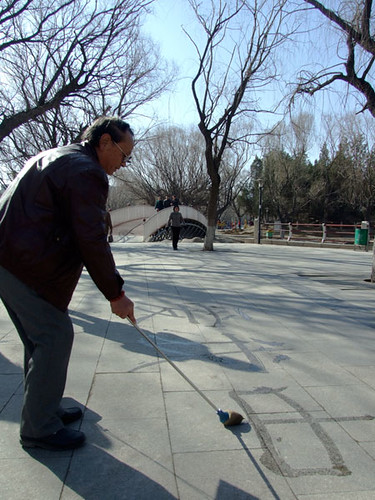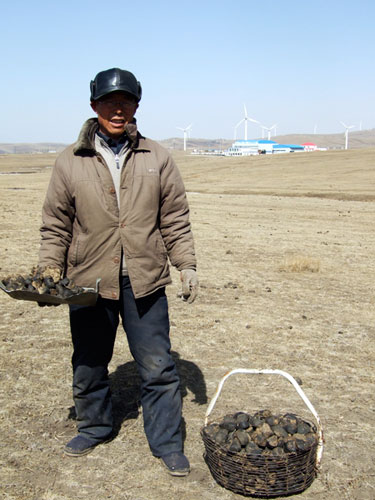This is a guest post by Katrina Hamlin, who last year blogged, from Chengdu, the one year anniversary of the Wenchuan earthquake. Now, in the wake of the Yushu quake, she returns to the topic of youth involvement in relief efforts, interviewing (by email and Skype) her former students.
*
On 12th May 2009 I reported Chengdu students’ quiet but sincere response to the Sichuan disaster’s first anniversary. Walter Brown, manager at Sichuan Quake Relief, suggested that their concern and desire to help represented the growth of China’s civil society. He described children telling the world “I want to grow up to be a volunteer”. The earthquake had wrecked havoc in some of China’s poorest and most vulnerable communities, but something positive was emerging from the mess.
A desire to volunteer was strengthened by the Beijing Olympics. People were keen to play a part in hosting the games. It was an honour to be among the volunteers lending a hand, representing China. As a Brit I was repeatedly asked whether or not I would volunteer for the London Olympics. Many were shocked when I admitted that I simply wasn’t interested in the Olympics and might even be in China in 2012.
The government has also been investigating the possibilities. A number of think tanks are researching social innovation, and Beijing hosted an international conference examining the ways in which civil society can help development.
So I expected students and young people in Chengdu and elsewhere to pursue a growing interest in volunteering and the third sector. I thought that Qinghai’s quake would be another catalyst. It’s two weeks until the second anniversary of the 2008 quake in Sichuan, and the papers are full of Yushu’s tragedy. The Sichuanese are experiencing vivid deja vu. “Every time I heard earthquake it will remaind [sic] me of Sichuan,” wrote a student from Sichuan Normal University.
Qinghai’s disaster is smaller in scale than Sichuan’s but no less devastating for the individuals involved; and like the 2008 quake, it will be followed by another event that is a matter of national pride. Next month Shanghai will open the 2010 Expo. That doesn’t mean very much to my friends in England, but the festival has been eagerly anticipated in China. When I first visited the city in 2005 they already had a clock counting down the seconds until the opening. Like the Olympics, there’s an understanding that individual citizens can help show China in a positive light. Opportunities to influence the Expo’s success range from working the pavilions to breaking the age old habit of wandering downtown Shanghai in pyjamas.
I asked my former student Jasmine and some of her friends about their responses to the quakes, how they went about showing their sympathy and helping the victims. Jasmine herself lived through the Sichuan quake. She and two of the other participants were among those I interviewed on the quake’s first anniversary in 2009.
Some of them expressed a desire to be actively involved in relief work, and felt that wanting to be a volunteer was increasingly common.
If i have chance to be a volunteer or give my sympathy directly to the people here,i will help them without any hesitation – Voilet
I want to do more things to help them just as others helped me in 2008 – Demo
I would like to be a volunteer if I can ! … i think there will be more and more youth take part in volunteer jobs – Leon
…from my point of view,before the earthquake
and the Beijing Olympics,there are already many young people
wanted to contribute themself to something,but for some reasons,
like they don’t know what to do or have no determinations,these
two gave them a chance to find it out,they feel strongly that the
sociaty [sic] needs them’ – Moon
But this was not a universal reaction, and those who wanted to be involved foresaw problems. It is difficult to volunteer. After the Sichuan quake, the press and other organisations called for volunteers. This time, it is harder to find that kind of opportunity. If there is no organisation with which to volunteer, efforts may be futile and could even make things worse. China has ‘such a lot of good students, and such a lot of excellent people’ who would want to thrown themselves into voluntary work if given the chance. But if you let them get involved, there could be “some trouble”, Jasmine admitted; not everyone has the necessary expertise.
In a follow-up interview Jasmine added that there were additional problems. You could ask to volunteer with an organisation. But they would most probably ask for certain documents, or request that you go and register you interest at such and such an office, where you would be sent on to another office, and then another. An alternative would be to set up a team of volunteers of your own. But that wouldn’t be easy, they may also lack the necessary know-how, and in some circumstances it’s likely that it wouldn’t be allowed. As Jasmine summed up, “procedure will be complicated” for a would-be volunteer. She also pointed out that this earthquake, even coupled with the expo, would not push the voluntary movement forward (at least in Sichuan) because the tragedy in Qinghai is still dwarfed by Sichuan’s disaster.
The Sichuan quake also saw a great call for fundraising. Organizations and individuals gave generous donations of money and goods. But this time, things are different.
i can’t make sure if the money i donate will be used properly – Moon
about the money, I m not quite sure the all the money will be uesd [sic] where it should be – Leon
Scandals following dubious fundraising by public figures like Zhang Ziyi have caused some to lose faith in charitable giving. Others were still keen to donate, but Jasmine pointed out that unlike in 2008 there hadn’t been any requests for public donations in the media.
Civil society needs space and particular kinds of opportunities for good will to grow into something practical. In that sentence, I’m afraid the word ‘opportunities’ includes the disasters that provoke an acute desire to contribute something, anything, for the cause. In China, patriotism is also a greater motivation than it is elsewhere; “Smply,we love China!And China need us,” said Demo. But the structures and organisations needed to use these opportunities are still hard to find.



